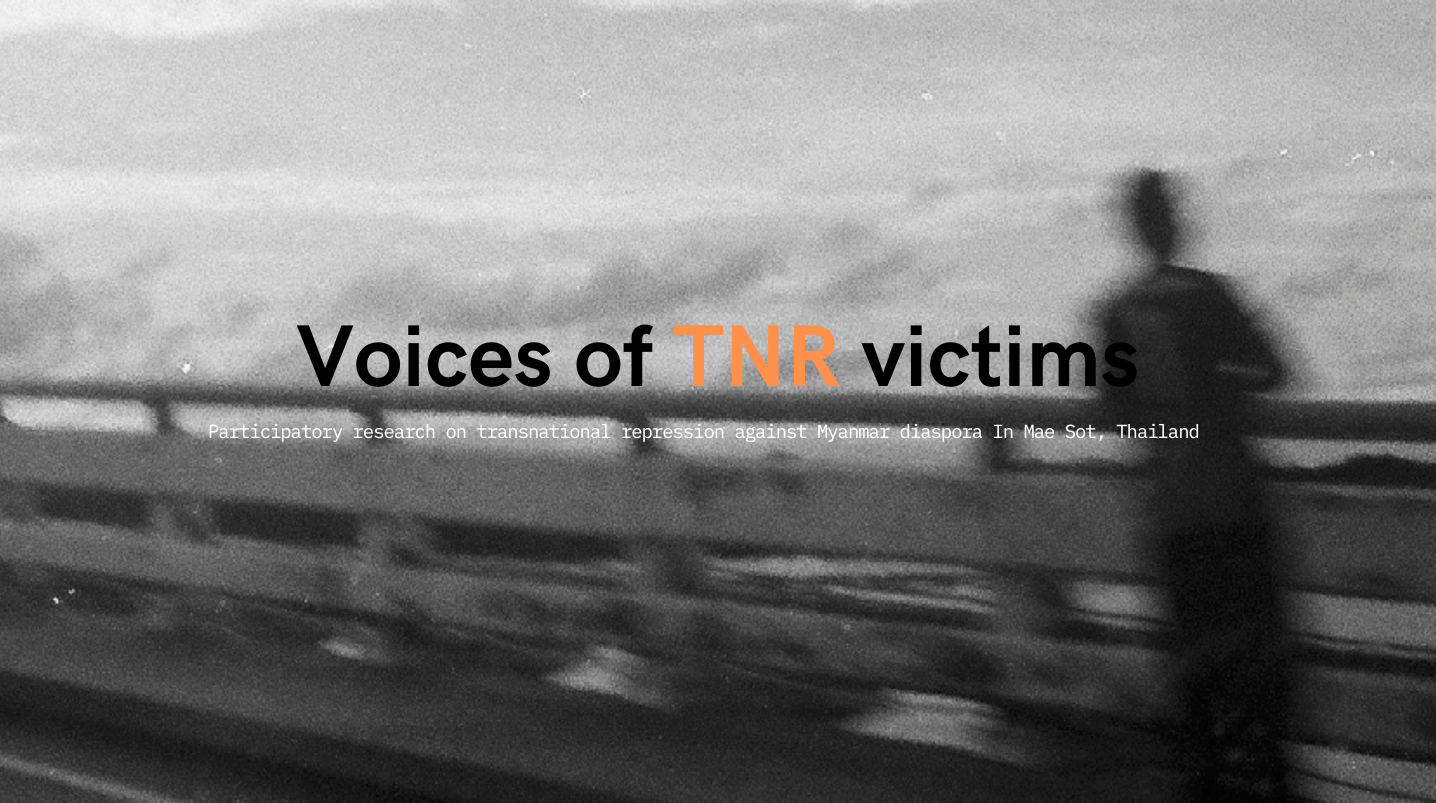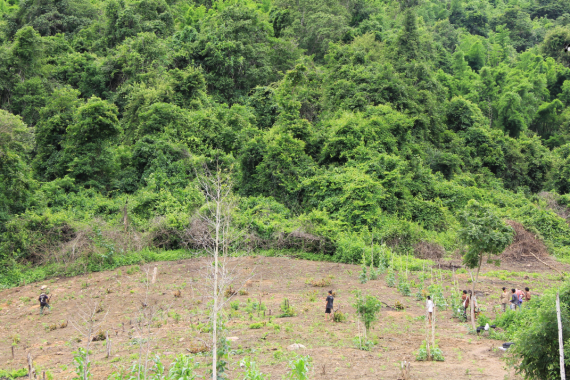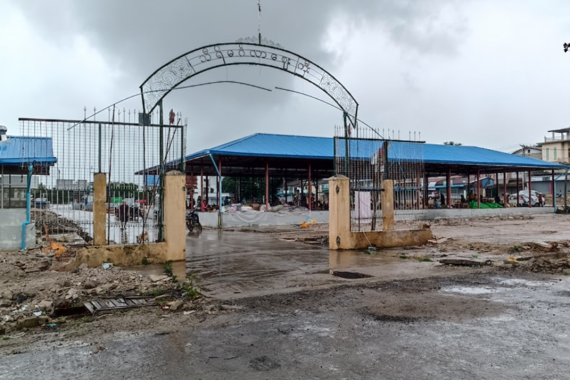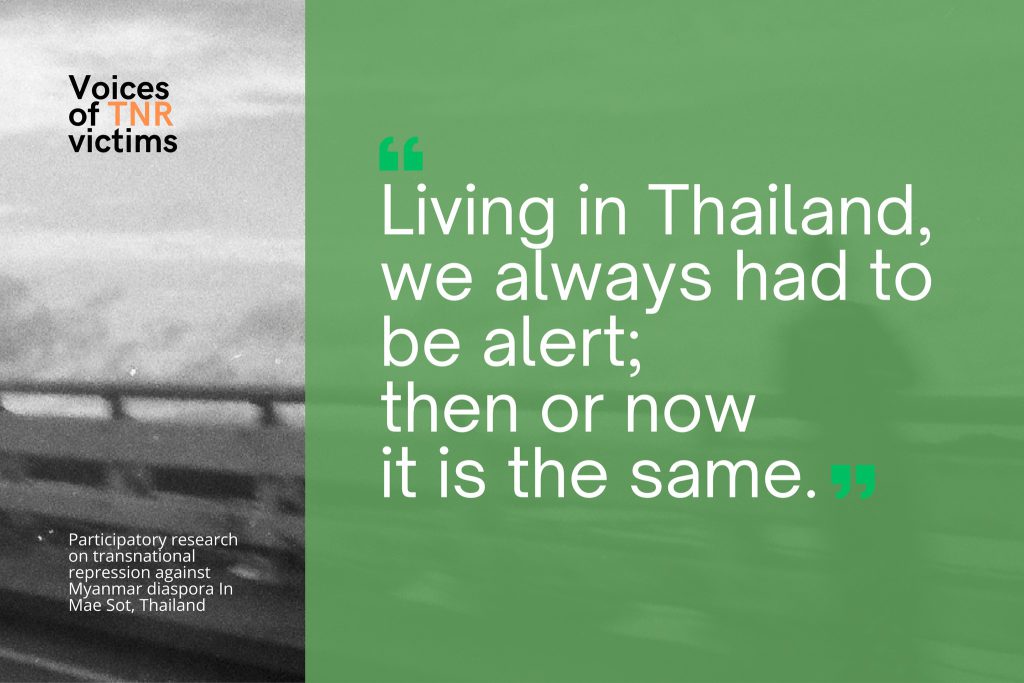
Voices of TNR victims No.1 (Perceptions towards TNR)
“การใช้ชีวิตในประเทศไทย เราต้องระมัดระวังอยู่เสมอ; เมื่อก่อนหรือตอนนี้ก็เหมือนกัน ฉันจำได้เมื่อ 20 ปีที่แล้วเมื่อสมาชิกในองค์กรนักเรียนของเราบางคนถูกจับได้ว่าเป็นสายลับของ SPDC คนหนึ่งสารภาพว่าเขาทำเพราะไม่มีทางเลือก; แม่ของเขาอยู่ในมือของพวกเขา ด้วยประสบการณ์เช่นนี้ ฉันคาดหวังว่า SAC จะไม่ปล่อยให้พวกเราอยู่กันอย่างสงบง่ายๆ คนที่หนีมาที่นี่ต้องตระหนักถึงความจริงข้อนี้ นี่ไม่ใช่เรื่องที่ไม่คาดคิด พวกเขา (ทหารพม่า) มองพวกเราเป็นศัตรูและพวกเขาจะหาทางกำจัดหรือทำให้ศัตรูของพวกเขาเงียบไป”
– สมาชิกองค์กรการเมือง, ชาย
“Living in Thailand, we always had to be alert; then or now – it is the same. I remember 20 years ago when a few of our (student) organization’s members were caught as SPDC spies. One confessed that he did it because he had no choice; his mother was in their hands. With such experiences, I can expect that SAC will not leave us in peace so easily. People who have fled here have to be well aware of the fact. This is not unexpected. They (Myanmar military) see us as their enemies and they will find a way to get rid of, or silence, their enemies.”
Member of a political organization, male
“ထိုင်းမှာနေရတာ ကျွန်တော်တို့အတွက် အမြဲသတိထားနေရတယ်။ ဟိုတုန်းကရော အခုရောပဲ- အတူတူပါပဲ။ လွန်ခဲ့တဲ့ နှစ် ၂၀ ကို သတိရတယ်။ ကျွန်တော်တို့ (ကျောင်းသား) အဖွဲ့အစည်းရဲ့ အဖွဲ့ဝင်တချို့ နအဖ ရဲ့ စပိုင်တွေအနေနဲ့ ဖမ်းခံခဲ့ရတယ်။ တစ်ယောက်က သူ့မှာ တခြားရွေးချယ်စရာ မရှိလို့ လုပ်ခဲ့ရတယ်လို့ ဝန်ခံတယ်။ သူ့အမေက သူတို့လက်ထဲမှာ ရှိတယ်။ ဒီအတွေ့အကြုံတွေ အရ စစ်ကောင်စီကလည်း ကျွန်တော်တို့ကို လွယ်လွယ်ကူကူတော့ ငြိမ်းငြိမ်းချမ်းချမ်းထားမှာ မဟုတ်ဘူး။ ဒီကို ထွက်ပြေးလာတဲ့ သူတွေအနေနဲ့ ဒီအချက်ကို ကောင်းကောင်း သတိထားရမယ်။ ဒါကို မျှော်လင့်ထားတာ မဟုတ်ဘူး။ သူတို့ (မြန်မာစစ်တပ်) က ကျွန်တော်တို့ကို သူတို့ရဲ့ ရန်သူတွေ အနေနဲ့ မြင်တယ်။ သူတို့က သူတို့ရဲ့ ရန်သူတွေကို ဖယ်ရှားမယ် ဒါမှမဟုတ် အသံတိတ်နေအောင် လုပ်ဖို့ နည်းလမ်းရှာမှာပဲ။”
ကျား၊ နိုင်ငံရေး အဖွဲ့အစည်းတစ်ခုမှ အဖွဲ့ဝင်
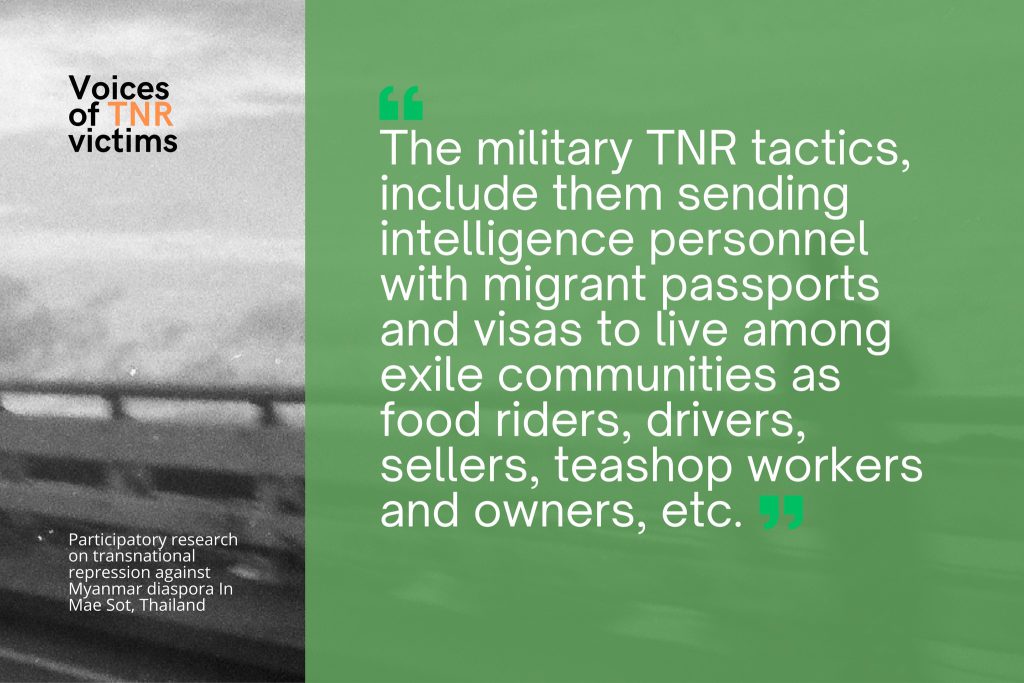
Voices of TNR victims No.2 (Perceptions towards TNR)
เท่าที่ฉันเข้าใจ กลยุทธ์ TNR ของทหารรวมถึงการส่งเจ้าหน้าที่ข่าวกรองที่ถือพาสปอร์ตและวีซ่าของผู้อพยพเพื่อมาอาศัยอยู่ในชุมชนผู้ลี้ภัย ทำงานเป็นผู้ส่งอาหาร คนขับรถ ผู้ขาย พนักงานร้านชา และเจ้าของร้านชา เป็นต้น บุคคลเหล่านี้จะส่งข้อมูลให้ตำรวจไทยเพื่อให้พวกเขาจับกุมเป้าหมาย ขู่กรรโชก หรือส่งกลับ ฉันรู้สึกไม่ปลอดภัยในแม่สอดเพราะฉันคิดว่าทางการพม่าอาจขอให้ทางการไทยจับกุมบุคคลที่พวกเขาต้องการได้ทุกเมื่อ
– อดีตข้าราชการหญิง
The military TNR tactics, as far as I understand, include them sending intelligence personnel with migrant passports and visas to live among exile communities as food riders, drivers, sellers, teashop workers and owners, etc. These people send information to Thai police so that they arrest the targets, extort them or send them back. I don’t feel safe in Mae Sot because I think Myanmar authorities can ask Thai authorities to arrest the person they want at any time.
– Former civil servant, female
“ထိုင်းမှာနေရတာ ကျွန်တော်တို့အတွက် အမြဲသတိထားနေရတယ်။ ဟိုတုန်းကရော အခုရောပဲ- အတူတူပါပဲ။ လွန်ခဲ့တဲ့ နှစ် ၂၀ ကို သတိရတယ်။ ကျွန်တော်တို့ (ကျောင်းသား) အဖွဲ့အစည်းရဲ့ အဖွဲ့ဝင်တချို့ နအဖ ရဲ့ စပိုင်တွေအနေနဲ့ ဖမ်းခံခဲ့ရတယ်။ တစ်ယောက်က သူ့မှာ တခြားရွေးချယ်စရာ မရှိလို့ လုပ်ခဲ့ရတယ်လို့ ဝန်ခံတယ်။ သူ့အမေက သူတို့လက်ထဲမှာ ရှိတယ်။ ဒီအတွေ့အကြုံတွေ အရ စစ်ကောင်စီကလည်း ကျွန်တော်တို့ကို လွယ်လွယ်ကူကူတော့ ငြိမ်းငြိမ်းချမ်းချမ်းထားမှာ မဟုတ်ဘူး။ ဒီကို ထွက်ပြေးလာတဲ့ သူတွေအနေနဲ့ ဒီအချက်ကို ကောင်းကောင်း သတိထားရမယ်။ ဒါကို မျှော်လင့်ထားတာ မဟုတ်ဘူး။ သူတို့ (မြန်မာစစ်တပ်) က ကျွန်တော်တို့ကို သူတို့ရဲ့ ရန်သူတွေ အနေနဲ့ မြင်တယ်။ သူတို့က သူတို့ရဲ့ ရန်သူတွေကို ဖယ်ရှားမယ် ဒါမှမဟုတ် အသံတိတ်နေအောင် လုပ်ဖို့ နည်းလမ်းရှာမှာပဲ။”
– အစိုးရ ဝန်ထမ်းဟောင်း။ မ
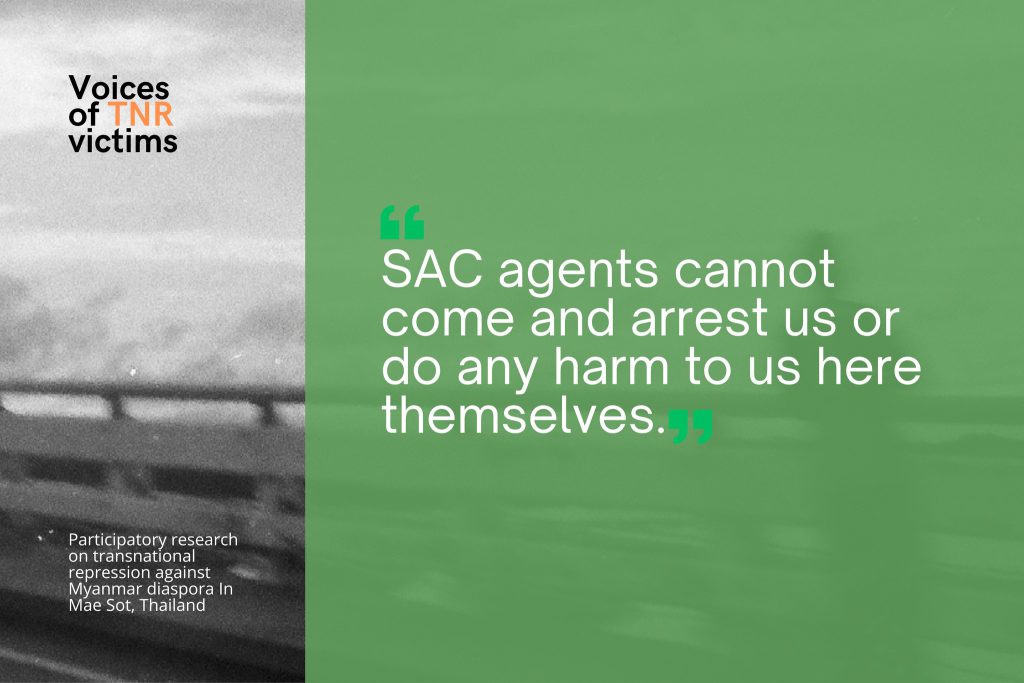
Voices of TNR victims No.3 (Patterns of transnational repression)
เราคิดว่าเจ้าหน้าที่ SAC ไม่สามารถเข้ามาจับกุมหรือทำร้ายเราด้วยตัวพวกเขาเอง แต่เรามั่นใจว่าต้องมีเหตุการณ์หรือองค์ประกอบอะไรบางอย่างที่สามารถเอื้อให้ผู้มีอำนาจในไทยเข้าจับกุมได้ เราสังเกตว่าทางการไทยรู้ว่าใครอยู่ที่ไหนอย่างแม่นยำ เมื่อเขาต้องการจับกุมคนที่เขาต้องการ พวกเขามีแม้กระทั่งชื่อ และรูปพรรณของพวกเขา
– สมาชิกพรรคการเมือง, ชาย
I think SAC agents cannot come and arrest us or do any harm to us here themselves. But I am sure that there have been a kind of situation when it gives information of the people it wants to Thai authorities to act. I saw how Thai officials knew the exact location when they went to arrest people. They even had photos to check the names and faces.
– Member of a Political Party, Male
“ကျွန်တော့်အထင်ကတော့ စစ်ကောင်စီ အေးဂျင့်တွေက ဒီနေရာကို သူတို့ ကိုယ်တိုင် ကျွန်တော်တို့ ကို ဖမ်းဆီးဖို့ ဒါမှမဟုတ် အန္တရာယ်ပြုဖို့ မလာနိုင်ဘူးလို့ ထင်တယ်။ ဒါပေမယ့် သေချာတာကတော့ ထိုင်းအာဏာပိုင်တွေ လုပ်ဆောင်ဖို့ သူတို့ လိုချင်တယ်ဆိုရင် လူတွေ အကြောင်းအချက်အလက်တွေကို ပေးနိုင်တဲ့ အခြေအနေမျိုး ရှိနိုင်မယ်ဆိုတာတော့ သေချာပါတယ်။ ထိုင်းအာဏာပိုင်တွေက လူတွေကို ဖမ်းချင်တဲ့အခါ နေရာအတိအကျ သိထားတာမျိုး ကျွန်တော် တွေ့ရတယ်။ သူတို့မှာ နာမည်နဲ့ မျက်နှာကို စစ်ဆေးဖို့ ဓါတ်ပုံတွေတောင် ရှိသေးတယ်။”
နိုင်ငံရေး ပါတီ တစ်ခု၏ အဖွဲ့ဝင်။ ကျား။
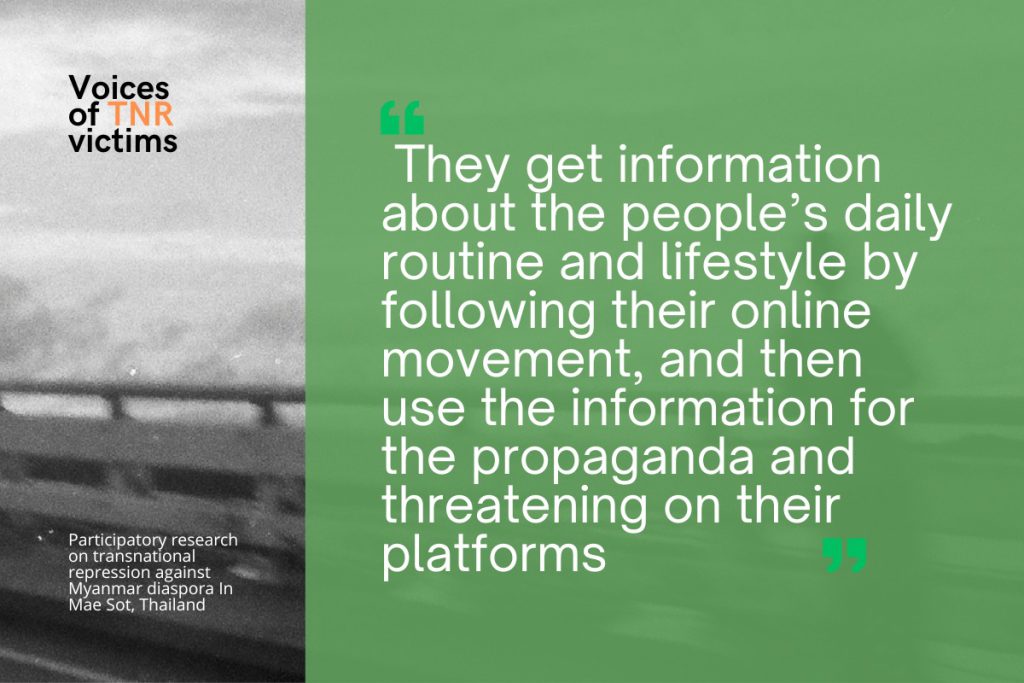
Voices of TNR victims No.4 (Patterns of transnational repression)
นอกจากการเข้าถึงตัวพวกเราแล้ว ยังมีการคุกคามออนไลน์ ทหารพยายามแอบส่องผู้ลี้ภัยและผู้ที่ไม่เห็นด้วยกับรัฐในแม่สอดผ่านระบบออนไลน์ พวกเขาได้ข้อมูลเกี่ยวกับชีวิตประจำวันและความสนใจผ่านการเคลื่อนไหวออนไลน์ และใช้ข้อมูลสำหรับโฆษณาชวนเชื่อ คุกคามพวกเขาบนแพลตฟอร์มเช่น ทีวีออนไลน์ แชทเทเลแกรม เป็นต้น
– นักศึกษามหาวิทยาลัย, หญิง
Besides trying to reach us physically, there is an online threat. The military has a way to stalk refugees and dissidents in Mae Sot online. They get information about the people’s daily routine and lifestyle by following their online movement, and then use the information for the propaganda and threatening on their platforms such as online TV, telegram channels, etc.
– University student, female
“မိမိတို့ထံသို့ ရုပ်ပိုင်းဆိုင်ရာအရ လက်လှမ်းမီဖို့ ကြိုးစားတဲ့အပြင် အွန်လိုင်ကလည်း ခြိမ်းခြောက်မှု ရှိပါတယ်။ စစ်တပ်က မဲဆောက်မှာရှိတဲ့ ဒုက္ခသည်တွေနဲ့ အတိုက်အခံတွေကို အွန်လိုင်းက စောင့်ကြည့်တဲ့ နည်းလမ်းရှိတယ်။ သူတို့က လူတွေရဲ့ အွန်လိုင်း လှုပ်ရှားမှုတွေကို လိုက်ကြည့်ပြီး နေ့စဉ် ပုံမှန် လုပ်ငန်းတွေနဲ့ နေထိုင်မှု ပုံစံအကြောင်း အချက်အလက်တွေကို ရရှိတယ်။ နောက်ပြီး အဲဒီ အချက်အလက်တွေကို အွန်လိုင်း TV၊ တယ်လီဂရမ် လိုင်း၊ စတဲ့ ပလက်ဖောင်းတွေမှာ ဝါဒဖြန့်ချီဖို့ နဲ့ ခြိမ်းခြောက်ဖို့အတွက် အသုံးပြုတယ်။”
– တက္ကသိုလ်ကျောင်းသူ၊ မ
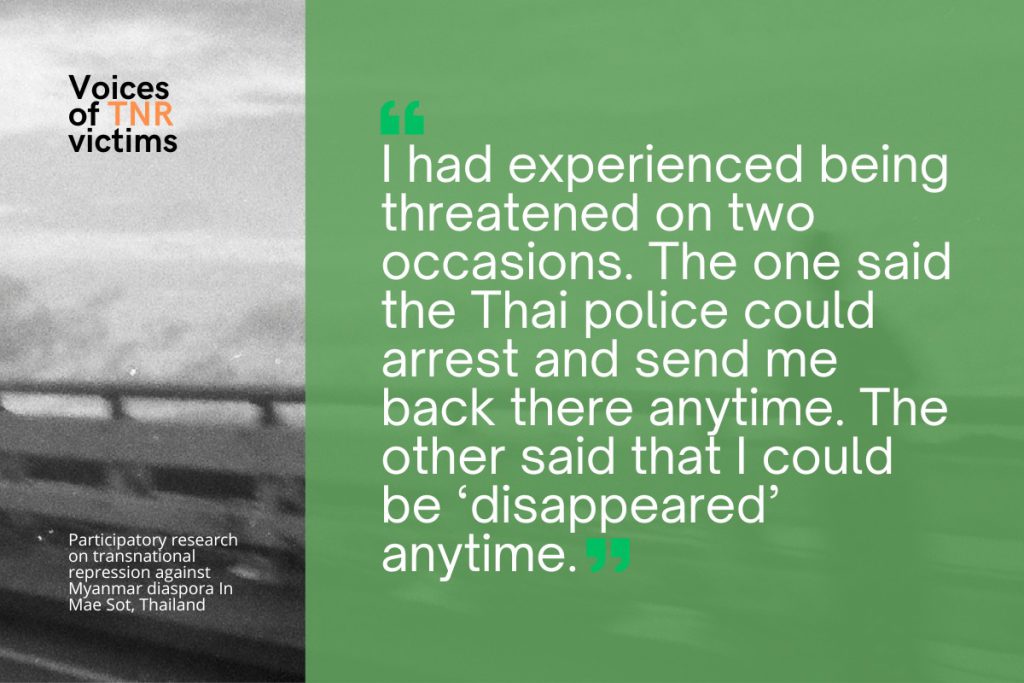
Voices of TNR victims No.5 (Patterns of transnational repression)
แทนที่จะเป็นการเผชิญหน้า พวกเขาส่งข้อความคุกคามเราผ่านระบบออนไลน์ ฉันเคยมีประสบการณ์ถูกคุกคามผ่านโปรแกรม Messenger อยู่สองครั้ง ข้อความมาจากผู้ใช้งานที่ไม่ระบุตัวตนโดยบอกว่า เขารู้ที่อยู่ของฉันในแม่สอด และเขามีแผนการบางอย่างให้ฉัน เมื่อฉันจะกลับเมียนมาร์ เขาบอกว่าตำรวจไทยสามารถจับกุมฉัน และส่งกลับได้ทุกเมื่อ และเขาบอกว่า เขาไม่ได้อยู่ไกลจากฉันเท่าไหร่ ส่วนอีกข้อความหนึ่งจะเป็นข้อความการขู่เอาชีวิตว่า “ฉันสามารถหายไปได้ทุกเมื่อ”
– อดีตสมาชิกกลุ่มติดอาวุธ, ชาย
Instead of coming face-to-face, they sent threatening messages online. I had experienced being threatened via Messenger on two occasions. The message was from an unknown account. The sender said he knew my address in Mae Sot and that he has already had a plan for me once I returned to Myanmar. He said the Thai police could arrest and send me back there anytime. The person also said that he was not far from me. The other one was more a kind of life-threatening text. It said that I could be ‘disappeared’ anytime.
– former member of armed resistance group, male
“မျက်နှာချင်းဆိုင် တွေ့ဆုံမယ့်အစား သူတို့က ခြိမ်းခြောက်တဲ့ စာတိုတွေကို အွန်လိုင်းက ပို့တယ်။ ကျွန်တော်ကတော့ မက်ဆင်ဂျာကနေတဆင့် နှစ်ခါခြိမ်းခြောက်ခံရတယ်။ နာမည်မသိတဲ့ အကောင့်ကနေ စာတိုလာတယ်။ ပေးပို့တဲ့သူက မဲဆောက်မှာရှိတဲ့ ကျွန်တော့် လိပ်စာကို သိတယ်လို့ ပြောပြီး ကျွန်တော်မြန်မာနိုင်ငံကို ပြန်တာနဲ့ သူ့မှာ အစီအစဉ်ရှိပြီးသားဖြစ်တယ်လို့ ပြောတယ်။ သူက ထိုင်းရဲတွေက ကျွန်တော့်ကို အချိန်မရွေးဖမ်းပြီး ပြန်ပို့နိုင်တယ်လို့ ပြောတယ်။ အဲဒီလူက ကျွန်တော်နဲ့ မဝေးဘူးလို့လည်း ပြောတယ်။ နောက်တစ်ခုကတော့ အသက်အန္တရာယ်ခြိမ်းခြောက်တဲ့ စာသား မျိုး ဖြစ်တယ်။ ကျွန်တော် အချိန်မရွေး “ပျောက်သွား” နိုင်တယ်လို့ ရေးထားတယ်။”
– လက်နက်ကိုင် အဖွဲ့တစ်ခုမှ အဖွဲ့ဝင်ဟောင်းတစ်ဦး၊ ကျား။
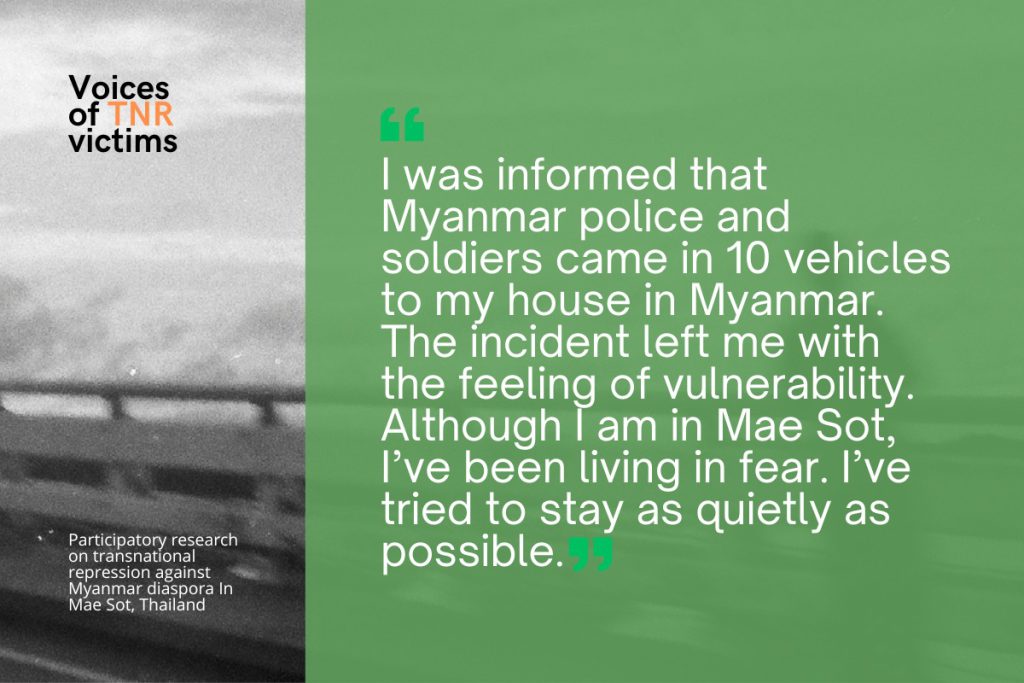
Voices of TNR victims No.6 (Patterns of transnational repression)
หลังจากที่ฉันอยู่แม่สอดได้หนึ่งเดือน ฉันตกใจมากที่ Han Nyein Oo นายทหารเมียนมาร์โพสต์ข้อมูลส่วนตัว ภาพถ่ายทั้งตัวฉัน และบ้านของฉันใน Telegram หลายวันต่อมาฉันจึงทราบว่ามีทหารและตำรวจมาหาฉันที่บ้านกว่า 10 คันรถ ถึงแม้ว่าฉันจะอยู่ที่แม่สอด ฉันก็ยังรู้สึกกลัวและกังวลมาก ทำให้ฉันต้องอยู่อย่างเงียบที่สุดเท่าที่จะเป็นไปได้
– อดีตเจ้าหน้าที่ราชการ, หญิง
After arriving in Mae Sot for a month, I shockingly found that Han Nyein Oo, an alleged military informant, posted my personal information, photos and home in Myanmar in the Telegram channel. A few days later (I was) informed that Myanmar police and soldiers came in 10 vehicles to my house in Myanmar. The incident left me with the feeling of vulnerability. Although I am in Mae Sot, I’ve been living in fear. I’ve tried to stay as quietly as possible.
– Former civil servant, female
“မဲဆောက်ကို ကျွန်မရောက်ပြီး တစ်လလောက်ကြာတဲ့ အခါ စစ်တပ်သတင်းပေးလို့ နာမည်ထွက်နေတဲ့ ဟန်ငြိမ်းဦးက ကျွန်မရဲ့ ပုဂ္ဂိုလ်ရေး အချက်အလက်တွေ၊ ဓါတ်ပုံတွေနဲ့ မြန်မာပြည်မှာရှိတဲ့ အိမ်လိပ်စာတွေကို တယ်လီဂရမ် ချယ်နယ်ကနေ တင်တာကို ကျွန်မ ထိပ်လန့်တကြားတွေ့လိုက်ရတယ်။ နောက်ရက်နည်းနည်းကြာတော့ မြန်မာရဲတွေနဲ့ စစ်သားတွေက မြန်မာနိုင်ငံမှာရှိတဲ့ ကျွန်မအိမ်ကို ကားဆယ်စီးလောက်နဲ့ ရောက်လာကြတယ်လို့ ကျွန်မကို ပြောပြလာတယ်။ ကျွန်မက မဲဆောက်မှာရှိနေပေမယ့် ကျွန်မ အကြောက်တရားနဲ့ နေရတယ်။ ကျွန်မ ဖြစ်နိုင်သမျှ ငြိမ်ငြိမ်လေး နေဖို့ ကြိုးစားခဲ့တယ်… “
– အစိုးရ ဝန်ထမ်းဟောင်း၊ မ။
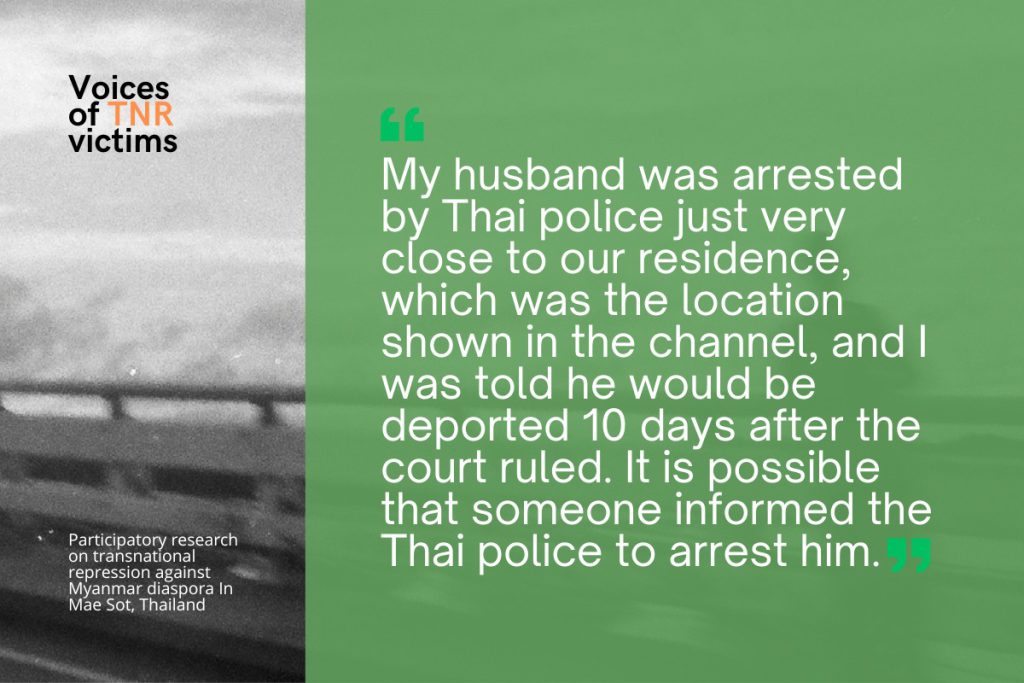
Voices of TNR victims No.7 (Patterns of transnational repression)
วันที่ 14 มิถุนายน 2023 เทเลแกรมของ Han Nyein Oo โพสต์เกี่ยวกับกิจกรรมของเราในเมียนมาร์ โดยมีภาพของพวกเราอยู่ในนั้นด้วย ฉันกลัวมากเพราะเขามีความเกี่ยวข้องกับกลุ่มก่อการร้ายใต้ดินที่มีทั้งการลักพาตัว ทรมาน และอุ้มฆ่าผู้ที่พยายามล้มล้างหรือต่อต้านการปกครอง สองสัปดาห์ต่อมา ผู้ใช้งานที่ไม่ระบุตัวตน แต่ลงทะเบียนด้วยเบอร์โทรศัพท์ของเมียนมาร์ ส่งภาพของเราสองคนในสถานที่ๆ เราอยู่ ณ ตอนนั้น รวมถึงที่อยู่อาศัย ชื่อและเบอร์โทรศัพท์ของสามี และชื่อเฉพาะของพ่อสามี ที่ใช้เรียกกันเองในวงการ-การเมือง
สามีของฉันจึงแจ้ง UNHCR ถึงการคุกคาม แต่ไม่มีอะไรเกิดขึ้น การคุกคามดำเนินต่อไปเป็นเดือนๆ จนวันหนึ่งที่สามีของดิฉันถูกจับโดยตำรวจไทย ซึ่งเขาถูกจับกุมใกล้บ้านซึ่งเป็นโลเคชั่นใกล้ๆ และฉันจึงได้ทราบว่า เขาจะถูกส่งกลับเมียนมาร์ภายใน 10 วันหลังจากศาลตัดสิน จึงเป็นไปได้มากว่า มีใครบางคนบอกให้ตำรวจไทยจับคุมเขา
– ภรรยาอดีตทหารที่ถูกควบคุมตัว
On June the 14th, 2023 Han Nyein Oo Telegram channel posted about our activity in Myanmar with our photos. I was scared because Han Nyein Oo is related to underground terrorist groups that kidnap, torture and murder those against the regime. Two weeks later, an unknown account with Myanmar registered number sent two photos of ours with our present location, our residence address, my husband’s phone number and his father’s nickname known only among his political party.
My husband informed UNHCR about the threats but nothing happened and the threats continued for a month. Then one afternoon, a month and a half after the first Telegram post, my husband was arrested by Thai police just very close to our residence, which was the location shown in the channel, and I was told he would be deported 10 days after the court ruled. It is possible that someone informed the Thai police to arrest him.
– Wife of a detained former military personnel
“၂၀၂၃ ခုနှစ် ဇွန်လ ၁၄ ရက်နေ့က ဟန်ငြိမ်းဦး တယ်လီဂရမ် ချယ်နယ်မှာ မြန်မာပြည်က ကျွန်မတို့ရဲ့ လှုပ်ရှားမှု တွေကို ဓါတ်ပုံနဲ့တကွ တင်လာတယ်။ ကျွန်မကြောက်သွားတယ် ဘာလို့လဲ ဆိုတော့ ဟန်ငြိမ်းဦးက စစ်အုပ်စုကို ဆန့်ကျင်တဲ့ သူတွေကို ပြန်ပေးဆွဲ၊ နှိပ်စက် သတ်ဖြတ်တဲ့ မြေအောက် အကြမ်းဖက်အုပ်စုတွေနဲ့ ဆက်စပ်နေလို့ပါ။ နောက်နှစ်ပါတ်ကြာတဲ့အခါ မြန်မာပြည် နံပါတ်နဲ့ ကျွန်မတို့ရဲ့ ဓါတ်ပုံတွေကို ကျွန်မတို့ရဲ့ လက်ရှိ တည်နေရာ၊ ကျွန်မတို့ အိမ်လိပ်စာ၊ ကျွန်မ ယောက်ျားရဲ့ ဖုန်းနံပါတ်နဲ့ သူ့အဖေရဲ့ သူတို့ပါတီထဲမှာပဲ သိတဲ့ နာမည်ဝှက်တွေနဲ့ တကွ ပို့လာတယ်။ ကျွန်မယောက်ျားက ဒီကိစ္စကို UNHCR ကို အသိပေးပေမယ့် ဘာမှ ဖြစ်မလာဘူး၊ ဒီခြိမ်းခြောက်မှုက တလလောက်ကြာအောင် ဆက်ဖြစ်နေတယ်။ ဒီလိုနဲ့ ပထမဆုံး တယ်လီဂရမ် ပို့စ် နောက်ပိုင်း တစ်လခွဲလောက်ကြာပြီးတဲ့နောက် နေ့ခင်းတစ်ခုမှာ ချယ်နယ်ထံမှာ လိပ်စာဖော်ပြထားတဲ့ ကျွန်မတို့ နေနေတဲ့ အိမ်နားမှာပဲ ကျွန်မယောက်ျားကို ထိုင်းရဲတွေက ဖမ်းလိုက်တယ်၊ နောက်ပြီး တရားရုံးက ဆုံးဖြတ်ချက်ချပြီး ဆယ်ရက်ကြာရင် သူတို့ မြန်မာပြည်ဘက် ပြန်ပို့မယ်လို့ ကျွန်မကို ပြောတယ်။ တစ်ယောက်ယောက်က ထိုင်းရဲကို ဖမ်းဖို့ သတင်းပေးလိုက်တာ ဖြစ်နိုင်တယ်။”
– ဖမ်းဆီးခံရသည့် စစ်သားဟောင်း၏ ဇနီး။
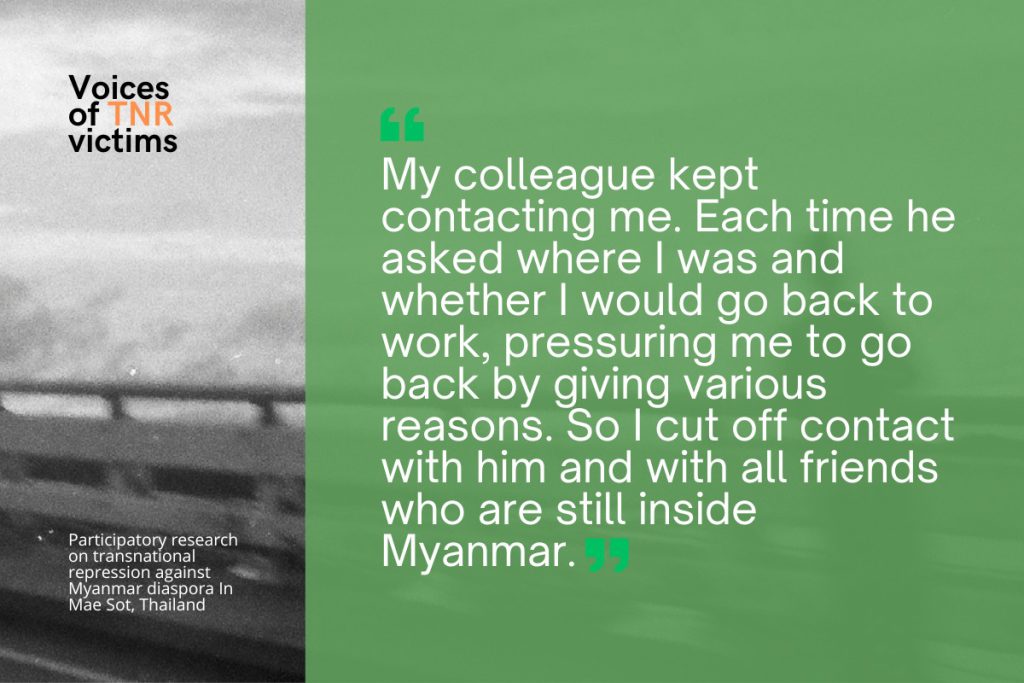
Voices of TNR victims No.8 (Patterns of transnational repression)
SAC พยายามตามจับกุมผู้ที่หนีออกจากประเทศ เขาสามารถแสดงให้โลกเห็นถึงความโหดร้ายทารุณของทหารเมียนมาร์ เพื่อนร่วมงานพยายามติดต่อฉันอยู่เสมอ แต่ละครั้งเขาถามว่าฉันเป็นยังไง และเมื่อไหร่ฉันจะกลับไปทำงาน เขาบอกว่า ถ้าฉันกลับไปเมื่อไหร่ กฎหมายมาตรา 505 จะถูกเพิกถอน เขาส่งข้อความและโทรหาฉันผ่านระบบออนไลน์เสมอเพื่อกดดันให้ฉันกลับไปทำงานด้วยเหตุผลหลายๆ อย่าง ฉันจึงตัดการติดต่อกับเขา และเพื่อนของเขาที่ยังอยู่ในเมียนมาร์
– อดีตข้าราชการ, หญิง
SAC tried to call people back. When they have escaped to other countries, they can show the world how cruel the military is. My colleague kept contacting me. Each time he asked where I was and whether I would go back to work. He said if I went back, the 505(a) (charge under the Penal Code) would be revoked. He kept sending messages and called me online, pressuring me to go back by giving various reasons. So I cut off contact with him and with all friends who are still inside Myanmar.
– Former civil servant, Female
“စစ်ကောင်စီက လူတွေကို ပြန်ခေါ်ဖို့ ကြိုးစားတယ်။ သူတို့တွေ တခြားနိုင်ငံကို လွတ်မြောက်သွားတဲ့အခါ စစ်တပ်က ဘယ်လောက် ရက်စက်တယ်ဆိုတာ သူတို့ က ကမ္ဘာကို ပြသနိုင်လို့ ဖြစ်တယ်။ ကျွန်မရဲ့ လုပ်ဖော်ကိုင်ဖက်က ကျွန်မကို အဆက်မပြတ် ဆက်သွယ်တယ်။ အကြိမ်တိုင်းမှာ သူက ကျွန်မဘယ်ရောက်နေတယ်၊ အလုပ်ကို ပြန်လာနိုင်မလားဆိုတာကို မေးတယ်။ သူက ကျွန်မ ပြန်လာရင် ၅၀၅ (က) နဲ့ စွဲဆိုထားတာကို ရုတ်သိမ်းပေးမယ်လို့ ပြောတယ်။ သူက စာတိုတွေ ဆက်တိုက်ပို့နေတယ်။ အွန်လိုင်းမှာ ကျွန်မကို ခေါ်တယ်။ အကြောင်းအမျိုးမျိုးပြပြီး ကျွန်မကို ပြန်လာဖို့ ဖိအားပေးမယ်၊ ဒါကြောင့် ကျွန်မ သူနဲ့ကော မြန်မာပြည်မှာ ကျန်နေခဲ့တဲ့ တခြား သူငယ်ချင်းတွေအားလုံးနဲ့ကော အဆက်အသွယ်ဖြတ်လိုက်တယ်။”
– အစိုးရ ဝန်ထမ်းဟောင်း။ မ။

Voices of TNR victims No.9 (Patterns of transnational repression)
กลยุทธ์หลักคือการล่อให้คนกลับไป SAC พยายามเรียกกลับคนในกองทัพที่เข้าร่วม CDM โดยการปล่อยข่าวปลอมว่าทุกข้อกล่าวหาจะถูกยกเลิกและทุกคนจะสามารถกลับไปหาครอบครัวได้อย่างสงบสุข จากนั้นพวกเขาจะให้คนติดต่อบุคคลผ่าน Messenger หรือ Telegram ผู้ลี้ภัยบางคนเชื่อเพราะข่าวนี้ได้แพร่กระจายในโซเชียลมีเดียแล้วว่ามีคนกลับไปและอยู่กับครอบครัวอย่างมีความสุข แต่คณะรัฐบาลทหารมักโกหก ในความเป็นจริงผู้ที่กลับไปได้รับโทษจำคุกยาวนานและแม้กระทั่งโทษประหารชีวิต หนึ่งในพันตรีที่ฉันรู้จักได้รับแจ้งว่าลูกสาวของเขาถูกนำส่งโรงพยาบาลและถ้าเขากลับไปหาเธอและภรรยาของเขา เขาจะได้งานคืนและทุกข้อกล่าวหาจะถูกยกเลิก พันตรีคนนั้นกลับไปแล้วก็หายไป ไม่มีใครรู้ว่าเขาอยู่ในคุกหรือถูกฆ่าตาย แต่ฉันรู้ว่าโทษสูงสุดสำหรับการแปรพักตร์คือโทษประหารชีวิต
– อดีตทหาร, หญิง)
The main tactic is to lure people to go back. SAC try to call back those in the army who joined CDM by releasing fake news that all the charges against us will be lift and all will be able to return to their family peacefully. Then they have someone contact individuals via Messenger or Telegram. Some refugees believed them because the news had already spread in social media before about how people had gone back and stayed happily with their families. But the junta always lie. In fact, those returnees got a long-time prison sentence and even death penalty. One of the Major’s I knew was told that his daughter was hospitalized and if he went back to her and his wife, he would get his job back and all the charges would be lifted. The Major went back and disappeared. Nobody knows whether he is in jail or killed. But I know the highest penalty for desertion is death.
– Former Military Personnel, Female
“အဓိက နည်းနာကတော့ လူတွေ ပြန်လာဖို့ ဖျားယောင်းတာပါ။ စစ်ကောင်စီက စစ်တပ်ကနေ CDM လုပ်လာတဲ့ သူတွေကို တရားစွဲဆိုထားတာတွေအားလုံး ရုတ်သိမ်းပေးမယ်၊ အားလုံး မိသားစုနဲ့အတူတူ ငြိမ်းငြိမ်းချမ်းချမ်း ပြန်နေရမယ် ဆိုပြီး သတင်းမှားတွေ ထုတ်လွှင်ပြီး ပြန်ခေါ်ဖို့ ကြိုးစားတယ်။ အဲဒီနောက် တစ်ယောက်ယောက်က အဲဒီလူပုဂ္ဂိုလ်တွေကို မက်ဆင်ဂျာ ဒါမှမဟုတ် တယ်လီဂရမ်ကနေ ဆက်သွယ်လာတယ်။ လူတွေ ဘယ်လို အိမ်ပြန်သွားကြတယ် သူတို့ မိသားစုတွေနဲ့ ပျော်ပျော်ရွှင်ရွှင် နေထိုင်နေကြတယ်ဆိုတဲ့ အကြောင်းတွေကို အရင်က လူမှု မီဒီယာမှာ ဖြန့်ထားတဲ့ သတင်းတွေကြောင့် တစ်ချို့ ဒုက္ခသည်တွေက သူတို့ကို ယုံကြတယ်။ ဒါပေမယ့် စစ်ကောင်စီက အမြဲတမ်း လိမ်တယ်။ အမှန်တကယ်က အဲဒီ ပြန်သွားတဲ့လူတွေ ထောင်ဒဏ် နှစ်ရှည်ချခံရတယ်။ တချို့တွေဆို သေဒဏ်တောင် ပေးခံရတယ်။ ကျွန်မ သိတဲ့ ဗိုလ်မှူးတစ်ယောက်ဆိုရင် သူ့ သမီးဆေးရုံတက်နေရတယ်။ တကယ်လို့ သူက သူ့သမီးနဲ့ မိန်းမဆီ ပြန်မယ်ဆိုရင် သူအလုပ်ကို ပြန်ရမယ်၊ စွဲဆိုထားတာတွေ အားလုံး ရုတ်သိမ်းပေးမယ်လို့ သူ့ကို ပြောတယ်။ ဗိုလ်မှူးက ပြန်သွားပြီး ပျောက်သွားတယ်။ သူ့ကို ထောင်ချလိုက်သလား၊ သတ်လိုက်သလားဆိုတာ ဘယ်သူမှ မသိဘူး၊ ဒါပေမယ့် လက်နက်ချတဲ့အတွက် အမြင့်ဆုံး ပြစ်ဒဏ်က သေဒဏ်ဆိုတာတော့ ကျွန်မ သိတယ်။”
– စစ်သားဟောင်း၊ မ။
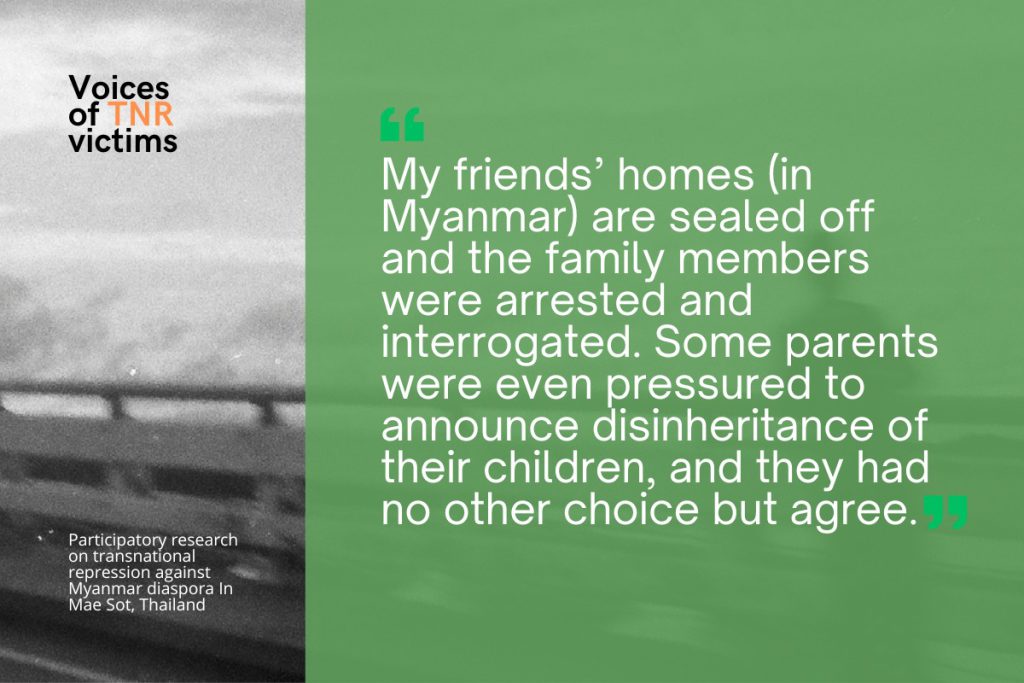
Voices of TNR victims No.10 (Patterns of transnational repression)
SAC ไม่สามารถติดต่อเพื่อนและคนรู้จักของฉันในแม่สอดได้ แต่พวกเขาสามารถติดต่อครอบครัวที่เหลืออยู่ในพม่าได้ บ้านของเพื่อน ๆ ของฉัน (ในพม่า) ถูกปิดล้อมและสมาชิกในครอบครัวถูกจับกุมและสอบสวน บางพ่อแม่ถูกกดดันให้ประกาศตัดขาดลูกของตน และพวกเขาไม่มีทางเลือกอื่นนอกจากยอมรับเพื่อความปลอดภัยของตัวเองและลูก ๆ ของพวกเขา สิ่งนี้ทำให้ผู้คัดค้านต้องเผชิญกับความกดดันมากมาย
– นักศึกษามหาวิทยาลัย, ชาย
SAC cannot reach my friends and my acquaintances in Mae Sot. But they can reach their homes and remaining family members in Myanmar. My friends’ homes (in Myanmar) are sealed off and the family members were arrested and interrogated. Some parents were even pressured to announce disinheritance of their children, and they had no other choice but agree just to keep both them and their children safe. This put a lot of pressure on the dissidents.
– University student, male
“စစ်ကောင်စီ က မဲဆောက်မှာရှိတဲ့ ကျွန်တော့် သူငယ်ချင်းတွေနဲ့ လုပ်ဖော်ကိုင်ဖက်တွေကို လက်လှမ်းမမီဘူး။ ဒါပေမယ့် သူတို့က သူတို့ရဲ့ အိမ်တွေနဲ့ မြန်မာပြည်မှာ ကျန်ခဲ့တဲ့ မိသားစုဝင်တွေကို လက်လှမ်းမီတယ်။ ကျွန်တော့် သူငယ်ချင်းတွေရဲ့ အိမ်တွေကို ချိပ်ပိတ်ပြီး မိသားစုဝင်တွေ အဖမ်းခံရ စစ်ဆေးတာ ခံရတာရှိတဆယ်။ တချို့မိဘာတွေက သူတို့ ကလေးတွေကို စွန့်လွှတ်ကြောင်း ကြေညာရတဲ့ အထိ ဖိအားပေးခံရတယ်၊။ သူတို့မှာ တခြား ရွေးချယ်စရာမရှိပဲ သူတို့နဲ့ သူတို့ရဲ့ ကလေးတွေ ဘေးကင်းလုံခြုံဖို့ကိုပဲ ရွေးချယ်ကြရတယ်။ သူတို့က အတိုက်အခံတွေအပေါ်မှာ ဖိအား တအားပေးတယ်။”
– တက္ကသိုလ်ကျောင်းသား၊ ကျား။
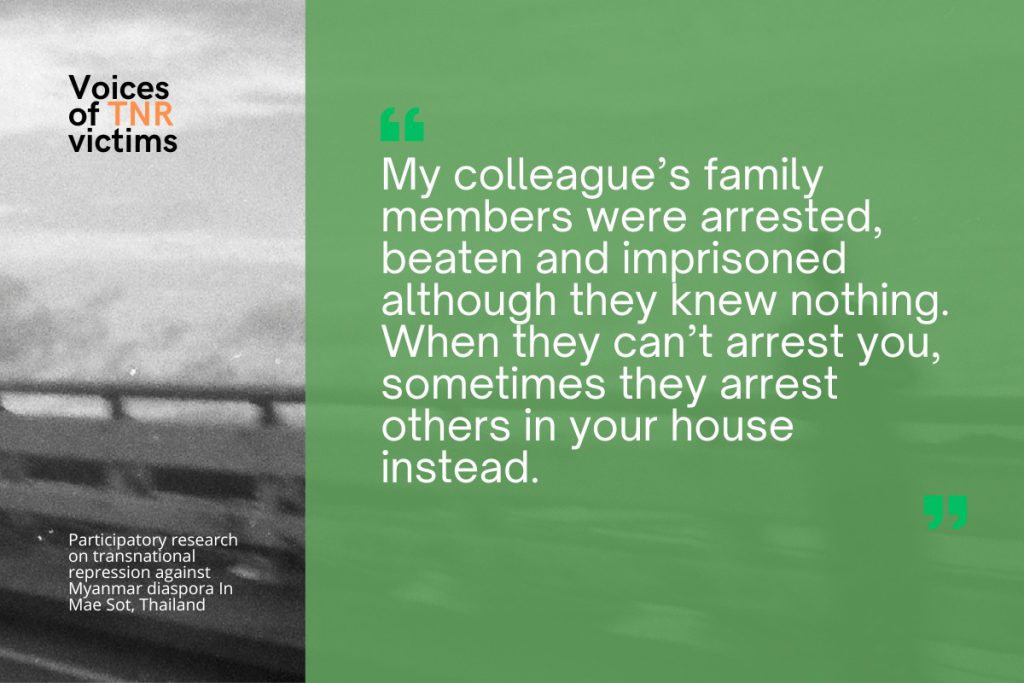
Voices of TNR victims No.11 (Patterns of transnational repression)
พ่อแม่ของฉันอายุเกิน 90 ปีแล้ว ดังนั้นฉันจึงไม่สามารถพาพวกเขามาที่นี่กับฉันได้ SAC ค้นบ้านของพวกเขาถึงห้าครั้งและบางครั้งก็ในเวลากลางคืน มีคนที่ถูกส่งโดย SAC ซึ่งฉันเชื่อว่า บุกเข้ามาในบ้านของเราหลังเที่ยงคืนและค้นหาฉัน เราทุกคนต้องเผชิญกับสิ่งนี้ สมาชิกในครอบครัวของเพื่อนร่วมงานของฉันถูกจับ ถูกทำร้าย และถูกคุมขังแม้ว่าพวกเขาจะไม่รู้อะไรเลยก็ตาม เมื่อพวกเขาไม่สามารถจับกุมคุณได้ บางครั้งพวกเขาก็จับคนอื่นในบ้านของคุณแทน ตอนนี้มีคำถามผุดขึ้นมาในหัวของฉันตลอดเวลา: พวกเขาจะจับกุมพ่อแม่ของฉันหรือไม่และเมื่อไหร่? พวกเขาจะทำอะไรกับพ่อแม่ของฉัน? สิ่งนี้ส่งผลกระทบต่อสุขภาพจิตของฉันอย่างรุนแรง
– สมาชิกองค์กรทางการเมือง, ชาย
My parents are over 90 years old so I couldn’t take them here with me. SAC searched their house five times and sometimes at nighttime. There were also people who were sent by SAC, I believe, broke into our house after midnight and looked for me. We all faced this. My colleague’s family members were arrested, beaten and imprisoned although they knew nothing. When they can’t arrest you, sometimes they arrest others in your house instead. Now questions are popping up in my head all the time: are they going to arrest my parents and when? What will they do to them? This seriously affects my mental health.
– Member of a political organization, male
“ကျွန်တော့် မိဘတွေက အသက် ၉၀ ကျော်တွေမို့ ကျွန်တော် သူတို့ကို ခေါ်မလာနိုင်ခဲ့ဘူး။ စစ်ကောင်စီက သူတို့အိမ်ကို ငါးကြိမ်ရှာတယ်။ တချို့တွေက ညအချိန်တွေ။ စစ်ကောင်စီက လွှတ်တဲ့ လူတွေလည်း ရှိနေတယ်၊ ကျွန်တော်တို့ အိမ်ကို ညသန်းခေါင်မှာ ဖောက်ဝင်ပြီး ကျွန်တော့်ကို ရှာတာရှိတယ်လို့ ကျွန်တော်ယုံတယ်။ ကျွန်တော်တို့ အားလုံးဒါကို ရင်ဆိုင်ရတယ်။ ကျွန်တော့် လုပ်ဖော်ကိုင်ဖက်တွေရဲ့ မိသားစုဝင်တွေ သူတို့ ဘာမှ မသိပေမယ့် အဖမ်းခံရတယ်၊ အရိုက်ခံရတယ်၊ ထောင်ချခံရတယ်။ သူတို့က ခင်ဗျားကို ဖမ်းလို့ မရတဲ့ အခါ ခင်ဗျားအိမ်မှာ ရှိတဲ့ တခြားသူတွေကို သူတို့ ဖမ်းတတ်တယ်။ အခုဆို ကျွန်တော့် ခေါင်းထဲမှာ မေးခွန်းတွေ ထွက်ထွက်လာနေတယ်။ ငါ့မိဘတွေကို သူတို့ ဖမ်းမှာလား၊ ဘယ်တော့လဲ။ သူတို့ သူတို့ကို ဘာတွေ လုပ်မလဲ။ ဒါဟာ တကယ့်ကို ကျွန်တော့်ရဲ့ စိတ်ကျန်းမာရေးကို ထိခိုက်စေတယ်။”
– နိုင်ငံရေး အဖွဲ့အစည်းတစ်ခု၏ အဖွဲ့ဝင်၊ ကျား။

Voices of TNR victims No.12 (Patterns of transnational repression)
กองทัพได้ออกหมายจับฉันในข้อหาหนีทหาร แต่ไม่มีอะไรเลวร้ายเกิดขึ้นจนกระทั่งฉันให้สัมภาษณ์สดที่ถ่ายทอดบนเฟซบุ๊ก ทันทีที่การสัมภาษณ์สดเริ่มในช่วงเย็น คนจากกองทัพเรือก็เข้าไปที่บ้านของพ่อฉัน และตามไปที่บ้านของพี่สาวและแม่ฉันซึ่งอยู่แยกกัน ทั้งหมดถูกสอบสวน ในขณะนั้นทั้งพ่อและแม่ยังไม่ได้ประกาศตัดขาดฉันในหนังสือพิมพ์ ฉันกลัวมากและไม่กล้าปรากฏตัวต่อสาธารณะอีก เมื่อสื่อมวลชนขอสัมภาษณ์เพิ่มเติม ฉันปฏิเสธ ฉันได้รับข้อความในบัญชีเฟซบุ๊กเก่าของฉันบอกว่าแม่จะถูกกักขังในเรือนจำที่มัณฑะเลย์ ฉันจึงลบบัญชีเฟซบุ๊กของฉันทิ้ง พี่สาวบอกฉันในภายหลังว่าแม่ของเราถูกกักขังนานถึง 40 วัน
– อดีตทหาร, หญิง
The army issued a deserter warrant for me but nothing bad happened until I gave a live interview broadcasting on Facebook. As soon as the interview went live in the evening, people from the navy entered my father’s house, and continued with my sister’s and my mothers who lived separately. They were all interrogated. At the time both my parents had not yet published their disin- heritance of me in the newspaper. I was very scared and did not dare to appear publicly any longer. When the media asked more more interviews, I declined. I’ve got a message in my old Facebook account telling me that my mother would be detained in a prison in Mandalay. I deleted my FB account. My sister later told me that our mother was detained for 40 days.
– Former military personnel, female
“စစ်တပ်က ကျွန်မကို တပ်ပြေး ဖမ်းဝရမ်းထုတ်ထားတယ်။ ဒါပေမယ့် Facebook ပေါ်မှာ ကျွန်မ အင်တာဗျူး တိုက်ရိုက် Live လွှင့်ပေးတဲ့ အချိန်အထိ ဆိုးဆိုးရွားရွား ဘာမှ မဖြစ်ခဲ့ဘူး။ ညနေပိုင်းမှာ အင်တာဗျူးကို လိုက်ဖ် လွှင့်ပြီးတာနဲ့ ရေတပ်က လူတွေက ကျွန်မအဖေအိမ်ကို ဝင်တော့တာပဲ အဲဒီကနေ သီးခြားစီ နေတဲ့ ကျွန်မရဲ့ အမနဲ့ အမေတို့အိမ်တွေကို ဆက်သွားတယ်။ သူတို့အားလုံး စစ်ဆေးမေးမြန်းခံရတယ်။ အဲဒီအချိန်တုန်းက ကျွန်မ မိဘတွေက သမီးအဖြစ်က စွန့်လွှတ်ကြောင်းကို သတင်းစာထဲမှာ မထည့်ရသေးဘူး။ ကျွန်မ အရမ်းကြောက်သွားပြီး နောက်ပိုင်းမှာ လူသိထင်ရှား မြင်သာတာတွေ မလုပ်ရဲတော့ဘူး။ မီဒီယာတွေက အင်တာဗျူးတွေ ထပ်တောင်းတဲ့အခါ ကျွန်မ ငြင်းလိုက်တယ်။ ကျွန်မရဲ့ Facebook အကောင့်ဟောင်းမှာ ကျွန်မအမေကို မန္တလေးထောင်မှာ ဖမ်းထားမယ်ဆိုတဲ့ စာတိုကို ရတယ်။ ကျွန်မရဲ့ Facebook အကောင့်ကို ကျွန်မ ဖျက်လိုက်တယ်။ နောက်ပိုင်းမှာ ကျွန်မတို့အမေကို ရက်ပေါင်း ၄၀ ထိန်းသိမ်းထားခဲ့တယ်ဆိုတာ အမက ပြောပြတယ်။”
– စစ်သားဟောင်း၊ မ။
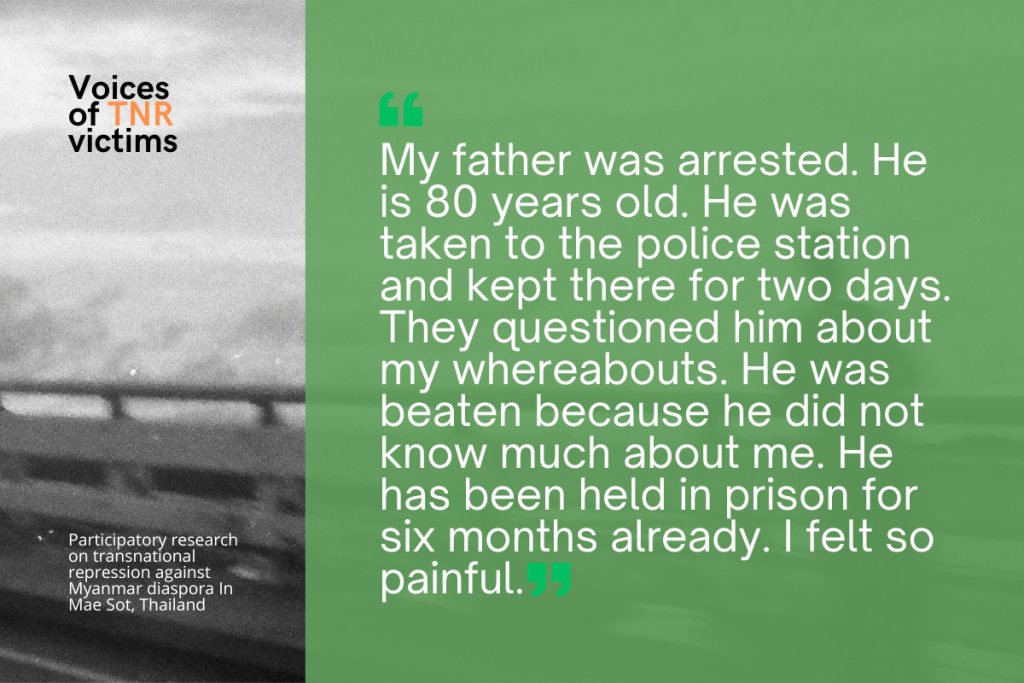
Voices of TNR victims No.13 (Patterns of transnational repression)
กองทัพได้ออกหมายจับฉันในข้อหาหนีทหาร แต่ไม่มีอะไรเลวร้ายเกิดขึ้นจนกระทั่งฉันให้สัมภาษณ์สดที่ถ่ายทอดบนเฟซบุ๊ก ทันทีที่การสัมภาษณ์สดเริ่มในช่วงเย็น คนจากกองทัพเรือก็เข้าไปที่บ้านของพ่อฉัน และตามไปที่บ้านของพี่สาวและแม่ฉันซึ่งอยู่แยกกัน ทั้งหมดถูกสอบสวน ในขณะนั้นทั้งพ่อและแม่ยังไม่ได้ประกาศตัดขาดฉันในหนังสือพิมพ์ ฉันกลัวมากและไม่กล้าปรากฏตัวต่อสาธารณะอีก เมื่อสื่อมวลชนขอสัมภาษณ์เพิ่มเติม ฉันปฏิเสธ ฉันได้รับข้อความในบัญชีเฟซบุ๊กเก่าของฉันบอกว่าแม่จะถูกกักขังในเรือนจำที่มัณฑะเลย์ ฉันจึงลบบัญชีเฟซบุ๊กของฉันทิ้ง พี่สาวบอกฉันในภายหลังว่าแม่ของเราถูกกักขังนานถึง 40 วัน
– อดีตทหาร, หญิง
The army issued a deserter warrant for me but nothing bad happened until I gave a live interview broadcasting on Facebook. As soon as the interview went live in the evening, people from the navy entered my father’s house, and continued with my sister’s and my mothers who lived separately. They were all interrogated. At the time both my parents had not yet published their disin- heritance of me in the newspaper. I was very scared and did not dare to appear publicly any longer. When the media asked more more interviews, I declined. I’ve got a message in my old Facebook account telling me that my mother would be detained in a prison in Mandalay. I deleted my FB account. My sister later told me that our mother was detained for 40 days.
– Former military personnel, female
“စစ်တပ်က ကျွန်မကို တပ်ပြေး ဖမ်းဝရမ်းထုတ်ထားတယ်။ ဒါပေမယ့် Facebook ပေါ်မှာ ကျွန်မ အင်တာဗျူး တိုက်ရိုက် Live လွှင့်ပေးတဲ့ အချိန်အထိ ဆိုးဆိုးရွားရွား ဘာမှ မဖြစ်ခဲ့ဘူး။ ညနေပိုင်းမှာ အင်တာဗျူးကို လိုက်ဖ် လွှင့်ပြီးတာနဲ့ ရေတပ်က လူတွေက ကျွန်မအဖေအိမ်ကို ဝင်တော့တာပဲ အဲဒီကနေ သီးခြားစီ နေတဲ့ ကျွန်မရဲ့ အမနဲ့ အမေတို့အိမ်တွေကို ဆက်သွားတယ်။ သူတို့အားလုံး စစ်ဆေးမေးမြန်းခံရတယ်။ အဲဒီအချိန်တုန်းက ကျွန်မ မိဘတွေက သမီးအဖြစ်က စွန့်လွှတ်ကြောင်းကို သတင်းစာထဲမှာ မထည့်ရသေးဘူး။ ကျွန်မ အရမ်းကြောက်သွားပြီး နောက်ပိုင်းမှာ လူသိထင်ရှား မြင်သာတာတွေ မလုပ်ရဲတော့ဘူး။ မီဒီယာတွေက အင်တာဗျူးတွေ ထပ်တောင်းတဲ့အခါ ကျွန်မ ငြင်းလိုက်တယ်။ ကျွန်မရဲ့ Facebook အကောင့်ဟောင်းမှာ ကျွန်မအမေကို မန္တလေးထောင်မှာ ဖမ်းထားမယ်ဆိုတဲ့ စာတိုကို ရတယ်။ ကျွန်မရဲ့ Facebook အကောင့်ကို ကျွန်မ ဖျက်လိုက်တယ်။ နောက်ပိုင်းမှာ ကျွန်မတို့အမေကို ရက်ပေါင်း ၄၀ ထိန်းသိမ်းထားခဲ့တယ်ဆိုတာ အမက ပြောပြတယ်။”
– စစ်သားဟောင်း၊ မ။
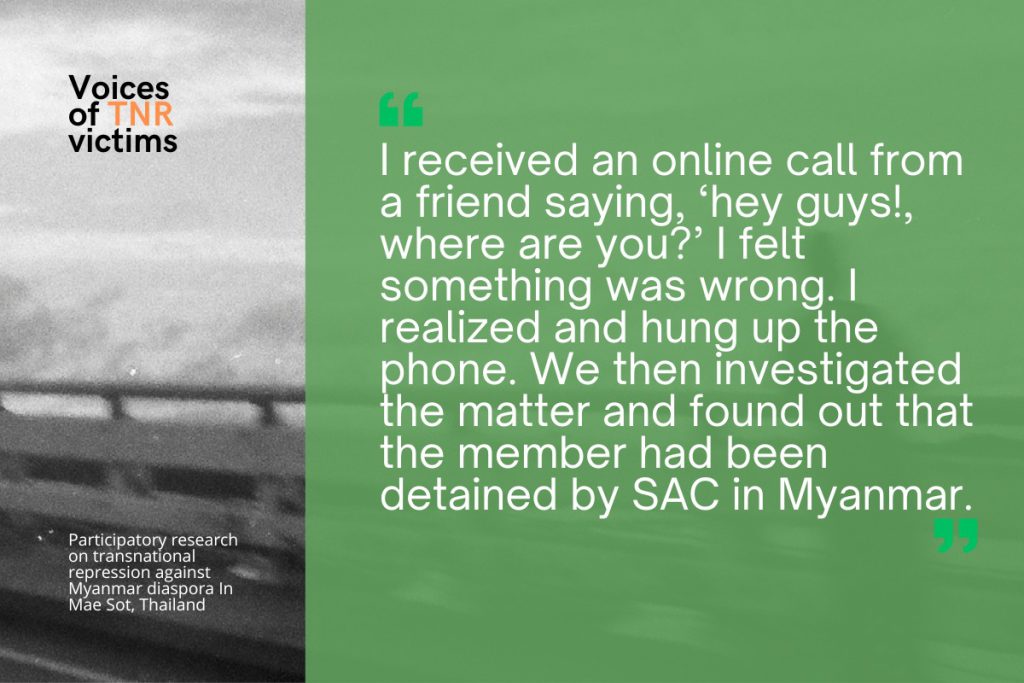
Voices of TNR victims No.14 (Patterns of transnational repression)
วันหนึ่งฉันได้รับสายออนไลน์จากเพื่อนคนหนึ่งที่พูดว่า “เฮ้ พวกนาย! อยู่ที่ไหนกัน?” ฉันรู้สึกว่ามีบางอย่างผิดปกติ พวกเราไม่เคยใช้คำว่า “เฮ้ พวกนาย!” ในกลุ่มเลย แต่เราจะใช้ชื่อเล่นที่รู้กันในกลุ่มเหมือนรหัสผ่าน ฉันก็เลยวางสายไป จากนั้นพวกเราก็สืบสวนเรื่องนี้และพบว่าเพื่อนคนนั้นถูกกองทัพ SAC ในเมียนมาร์ควบคุมตัว ฉันรู้สึกขอบคุณเขามากที่พยายามบอกคำที่ทำให้ฉันรู้ว่าเขาอยู่ภายใต้การบังคับ ไม่มีใครรู้ว่าจะเกิดอะไรขึ้นถ้าฉันบอกเขาว่าฉันอยู่ที่ไหน
– สมาชิกพรรคการเมือง, ชาย
One day I received an online call from a friend, saying, ‘hey guys!’, where are you?’ I felt something was wrong. We have never used the word ‘hey, guys!’ in the group but aliases known in the group as pass codes. I realized and hung up the phone. We then investigated the matter and found out that the member had been detained by SAC in Myanmar. I am very grateful to him how he managed to tell me the word that let me know he was under their force. Nobody know what would happen if I told him where I was.
– Member of a Political Party, Male
“တနေ့ ကျွန်တော် သူငယ်ချင်းတစ်ယောက်ဆီက အွန်လိုင်းခေါ်ဆိုမှု တစ်ခုကို ရတယ်။ သူက “ဟေ့ လူတွေ! မင်းတို့ဘယ်မှာလဲ” လို့ ပြောတယ်။ တစ်ခုခု မှားနေတယ်လို့ ကျွန်တော် ခံစားလိုက်ရတယ်။ ကျွန်တော်တို့ အုပ်စုထဲမှာ “ဟေ့ လူတွေ” လို့ ဘယ်တုန်းကမှ မသုံးဘူးဘူး။ ဒါပေမယ့် အုပ်စုအတွင်း လျို့ဝှက်ကုဒ်အဖြစ် သိကြတယ်။ ကျွန်တော် သဘောပေါက်လိုက်ပြီး ဖုန်းချလိုက်တယ်။ အဲဒီနောက် ဒီကိစ္စကို စုံစမ်းကြည့်တဲ့အခါ အဲဒီလူက မြန်မာနိုင်ငံမှာ စစ်ကောင်စီရဲ့ ထိန်းသိမ်းခြင်းကို ခံထားရတယ်ဆိုတာ တွေ့ရတယ်။ ကျွန်တော်သူ့ကို ကျေးဇူးတင်တယ် သူက အဲဒီ စကားလုံးကို သုံးပြီး သူက စကစ လက်ထဲရောက်နေတယ်ဆိုတာ ကျွန်တော့်ကို ပြောပြနိုင်လို့ဖြစ်တယ်။ ကျွန်တော် ဘယ်မှာ ရှိတယ်ဆိုတာ ပြောခဲ့ရင် ဘာဖြစ်မယ်ဆိုတာ ဘယ်သူမှ မသိဘူး။”
– နိုင်ငံရေး ပါတီ ဝင်၊ ကျား။
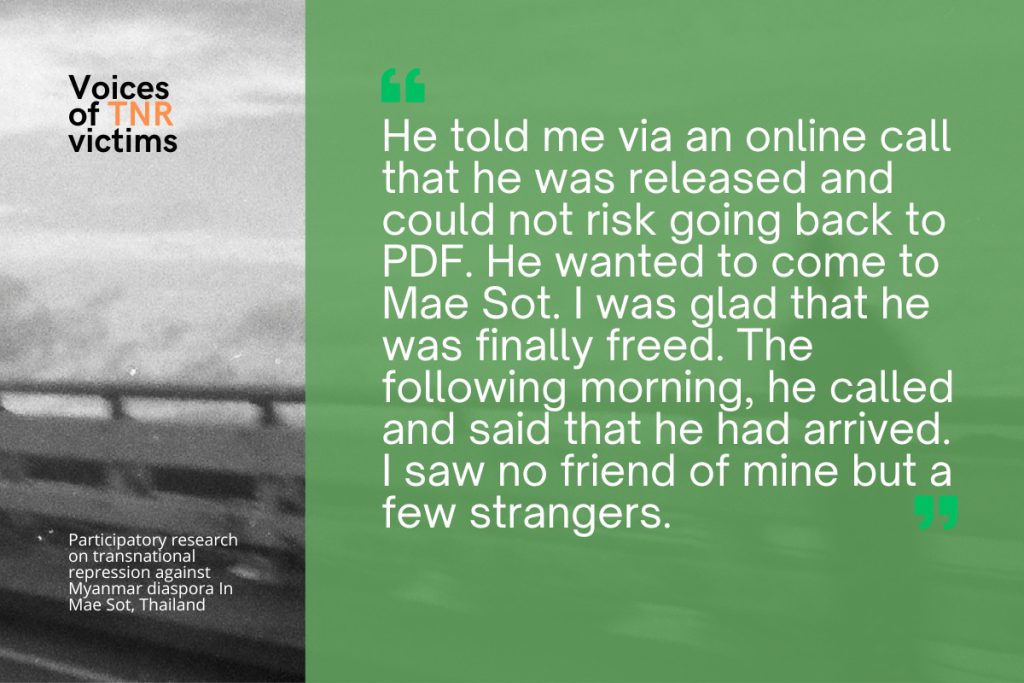
Voices of TNR victims No.15 (Patterns of transnational repression)
วันหนึ่ง ฉันได้รับการติดต่อจากเพื่อนคนหนึ่งที่เคยเข้าร่วมกับ PDF กับฉัน เมื่อไม่นานมานี้ เพื่อนของฉันถูกจับโดย SAC ขณะที่ฉันหลบหนีและมาถึงแม่สอดในที่สุด เขาบอกฉันผ่านการโทรออนไลน์ว่าเขาถูกปล่อยตัวแล้วและไม่สามารถเสี่ยงกลับไปที่ PDF ได้อีก เขาอยากมาที่แม่สอด ฉันดีใจมากที่เขาได้รับการปล่อยตัวในที่สุด ฉันบอกเขาว่าเขาสามารถอยู่กับเราได้และเขาสามารถหางานเล็กๆ น้อยๆ ทำเหมือนที่ฉันทำ ฉันให้เบอร์โทรศัพท์และที่อยู่ของฉันกับเขาและบอกเพื่อนร่วมห้องของฉันเกี่ยวกับเรื่องนี้
แต่เช้าวันต่อมา ขณะที่เพื่อนร่วมห้องและฉันอยู่ที่ทำงาน เพื่อนคนนั้นโทรมาบอกว่าเขามาถึงหน้าบ้านของเราแล้ว ฉันบอกเขาให้รออยู่ที่นั่นเพราะเราต้องทำงานให้เสร็จ แล้วเพื่อนร่วมห้องของฉันเริ่มรู้สึกสงสัยกับการมาถึงที่รวดเร็วของเขามากและแนะนำว่าเราควรรอดูจากระยะไกลเพื่อความแน่ใจ ดังนั้นเราจึงทำเช่นนั้น และที่นั่นฉันไม่เห็นเพื่อนของฉันเลย แต่เห็นคนแปลกหน้าไม่กี่คนอยู่ไม่ไกลจากบ้านของฉัน
– อดีตนักศึกษา และกองกำลังติดอาวุธ, ชาย
One day I got contacted by a friend who used to join (a) PDF with me. A while ago my friend was arrested by SAC while I escaped and finally arrived in Mae Sot. He told me via an online call that he was released and could not risk going back to PDF. He wanted to come to Mae Sot. I was glad that he was finally freed. I told him he could stay with us and he could get odd jobs like I did. I gave him my phone number and address and told my roommate about this.
But just in the following morning, while my roommate and I were at work, the friend called and said that he had arrived in front of our house. I told him to wait there because we had to finish our job. Then my roommate started to feel suspicious of his very fast arrival and suggested that we should wait and see from a far distance to make sure. So we did, and there I saw no friend of mine but a few strangers staying not far from my house.
– Former Student and Member Armed Resistance Group, Male
ကျွန်တော်က အိမ်နီးနားချင်းကို ဖုန်းလှမ်းဆက်ပြီး ကျွန်တော်ကို တစ်ယောက်ယောက် လာရှာ ရှိလား၊ အဲဒီလူက ဘယ်လိုပုံလဲ ၊ သူအဲဒီမှာ ရှိနေသလား လို့ မေးကြည့်တယ်။ သူက ကျွန်တော့်ရဲ့ သံသယကို အတည်ပြုပေးပြီး အဲဒီလူတွေ အနားမှာရှိနေတုန်းပဲလို့ ပြောပါတယ်။ ဒါကြောင့် ကျွန်တော် ပြေးရတော့မယ်ဆိုတာ သိတယ်။ အဲဒီညက ကျွန်တော်နဲ့ ကျွန်တော့်အခန်းဖော် အလုပ်က သူငယ်ချင်းတစ်ယောက် ဆီမှာ တည်းခိုခဲ့တယ်။ နောက်နေ့ကျတော့ အဲဒီလူတွေ ထပ်လာပြန်တယ်လို့ အိမ်နီးနားချင်းဆီက သိလိုက်ရတော့ တစ်လနီးပါးလောက် အဝေးမှာ ကျွန်တော်တို့ နေကြတယ်။ အကြောင်း တစ်ခုခုကြောင့် ကျွန်တော်တို့ကို ဖမ်းဖို့ကြိုးစားနေကြတယ်လို့ ထင်တယ်၊ ကျွန်တော့်ရဲ့ နေရာကို အတိအကျသိရဖို့အတွက် ကျွန်တော့် သူငယ်ချင်းကို ငါးစာ အဖြစ် သုံးလိုက်တာပဲ။ ဒီလူတွေက ဘယ်သူတွေလဲ ဆိုတာပြောဖို့ခက်တယ်။ ဘာလို့လဲ ဆိုတော့ မြဝတီမှာ ဓါတ်ပုံနဲ့ တကွ ကြေညာပြီး ကျွန်တော့်ကို ဝရမ်း ထုတ်ထားတယ်။
– ကျောင်းသားနှင့် လက်နက်ကိုင်တော်လှန်ရေးအဖွဲ့ ဝင် ဟောင်း၊ ကျား၊
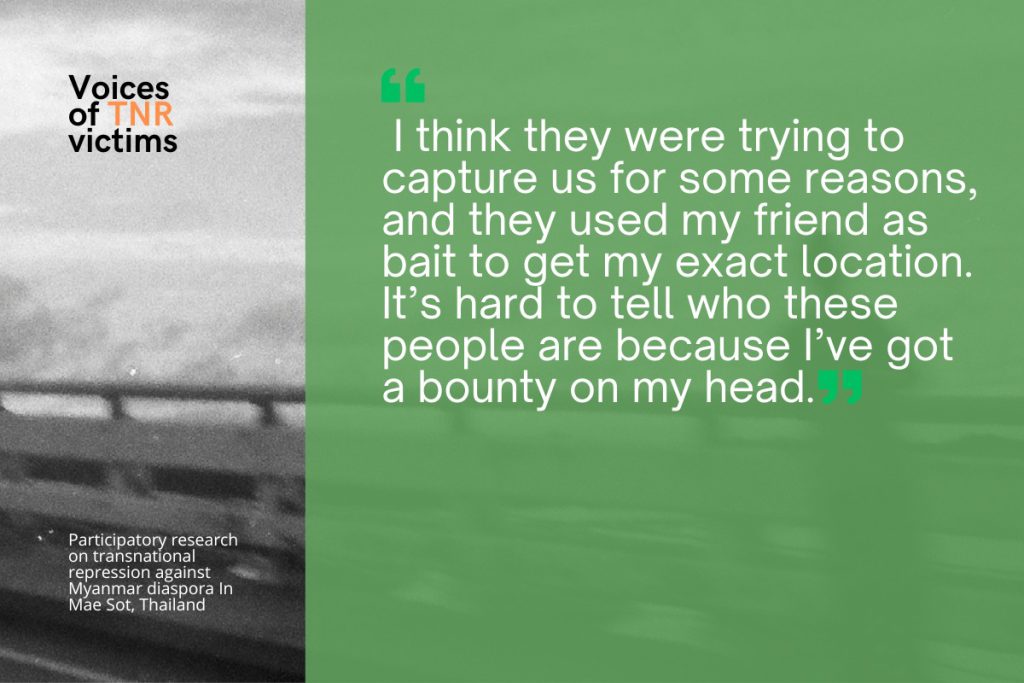
Voices of TNR victims No.16 (Patterns of transnational repression)
ผมโทรหาเพื่อนบ้านและถามว่ามีใครมาหาผมบ้างไหม คนคนนั้นหน้าตาเป็นอย่างไร และเขายังอยู่ที่นั่นหรือเปล่า เขายืนยันความสงสัยของผมและบอกว่าพวกนั้นยังอยู่แถวนี้ ผมจึงรู้ว่าผมต้องหนี คืนนั้นเพื่อนร่วมห้องกับผมไปพักอยู่กับเพื่อนจากที่ทำงาน วันรุ่งขึ้นผมทราบจากเพื่อนบ้านว่าพวกนั้นมาที่นี่อีก เราจึงหลบซ่อนตัวไปเกือบหนึ่งเดือน ผมคิดว่าพวกเขาพยายามจับตัวพวกเราเพื่อบางเหตุผล และใช้เพื่อนของผมเป็นเหยื่อล่อเพื่อให้ได้ตำแหน่งที่แน่นอนของผม มันยากที่จะบอกได้ว่าพวกเขาเป็นใครเพราะผมมีค่าหัว มันถูกประกาศพร้อมรูปของผมในหนังสือพิมพ์ Myawady (หนังสือพิมพ์รายวันของทหารพม่า)
– อดีตนักศึกษาและสมาชิกกลุ่มต่อต้านติดอาวุธ, ชาย
I rang my neighbor and asked if there was anyone came looking for me, how the person looked like and whether he was still there. He confirmed my suspicion and said that those guys were still around. So I knew I had to run. That night my roommate and I stayed with a friend from the workplace. The next day I found out from the neighbor that those guys came again, so we stayed away for almost a month. I think they were trying to capture us for some reasons, and they used my friend as bait to get my exact location. It’s hard to tell who these people are because I’ve got a bounty on my head. It was announced with my photo in Myawady (a Myanmar military daily newpaper)
– Former Student and Member Armed Resistance Group, Male
ကျွန်တော်က အိမ်နီးနားချင်းကို ဖုန်းလှမ်းဆက်ပြီး ကျွန်တော်ကို တစ်ယောက်ယောက် လာရှာ ရှိလား၊ အဲဒီလူက ဘယ်လိုပုံလဲ ၊ သူအဲဒီမှာ ရှိနေသလား လို့ မေးကြည့်တယ်။ သူက ကျွန်တော့်ရဲ့ သံသယကို အတည်ပြုပေးပြီး အဲဒီလူတွေ အနားမှာရှိနေတုန်းပဲလို့ ပြောပါတယ်။ ဒါကြောင့် ကျွန်တော် ပြေးရတော့မယ်ဆိုတာ သိတယ်။ အဲဒီညက ကျွန်တော်နဲ့ ကျွန်တော့်အခန်းဖော် အလုပ်က သူငယ်ချင်းတစ်ယောက် ဆီမှာ တည်းခိုခဲ့တယ်။ နောက်နေ့ကျတော့ အဲဒီလူတွေ ထပ်လာပြန်တယ်လို့ အိမ်နီးနားချင်းဆီက သိလိုက်ရတော့ တစ်လနီးပါးလောက် အဝေးမှာ ကျွန်တော်တို့ နေကြတယ်။ အကြောင်း တစ်ခုခုကြောင့် ကျွန်တော်တို့ကို ဖမ်းဖို့ကြိုးစားနေကြတယ်လို့ ထင်တယ်၊ ကျွန်တော့်ရဲ့ နေရာကို အတိအကျသိရဖို့အတွက် ကျွန်တော့် သူငယ်ချင်းကို ငါးစာ အဖြစ် သုံးလိုက်တာပဲ။ ဒီလူတွေက ဘယ်သူတွေလဲ ဆိုတာပြောဖို့ခက်တယ်။ ဘာလို့လဲ ဆိုတော့ မြဝတီမှာ ဓါတ်ပုံနဲ့ တကွ ကြေညာပြီး ကျွန်တော့်ကို ဝရမ်း ထုတ်ထားတယ်။
– ကျောင်းသားနှင့် လက်နက်ကိုင်တော်လှန်ရေးအဖွဲ့ ဝင် ဟောင်း၊ ကျား၊

บทสัมภาษณ์นี้เป็นส่วนหนึ่งของงานวิจัย “We Don’t feel Safe” ที่ว่าด้วยการปราบปรามข้ามชาติต่อชาวเมียนมาพลัดถิ่นในอำเภอแม่สอด จังหวัดตาก โดยสามารถดาวน์โหลดงานวิจัยเป็นภาษาเมียนมาร์ และภาษาอังกฤษได้ตั้งแต่วันที่ 20 มิถุนายนนี้ (วันผู้ลี้ภัยสากล)
Voices of TNR victims is a part of “We Don’t feel Safe” Participatory research on transnational repression against Myanmar diaspora In Mae Sot, Thailand. The full report in English and Burmese is available for download on World Refugee Day, 20 June 2024.

